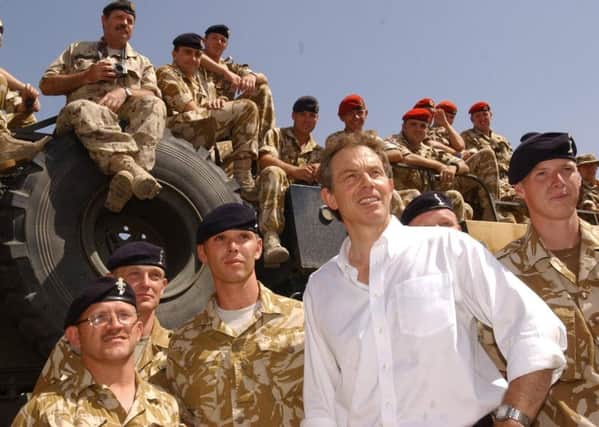Bill Carmichael: History may yet be kinder to Tony Blair over Iraq


Although this week the public prints have resounded to charges that he is at best a liar and at worst a monster and a terrorist, I suspect history may be considerably kinder to the former Prime Minister.
It is not that I fall for his undoubted skills as a charmer and political operator. In fact I can claim I saw through his “purer than pure” façade earlier than most. I began to have grave doubts about his character just six months after his “Things Can Only Get Better” election triumph in 1997, when he accepted a £1m party donation from Formula 1 boss Bernie Ecclestone in return for an exemption on the ban on tobacco advertising. This was, let us not forget, just months after Blair had excoriated the previous Major government for “Tory sleaze”.
Advertisement
Hide AdAdvertisement
Hide AdTeflon Tony somehow survived that scandal and went on to lead Labour to an unprecedented three consecutive general election triumphs – the last of which, it is worth noting, taking place two years after the beginning of the Iraq conflict.
But without doubt the invasion of Iraq is the defining event of his premiership and it is on that decision on which he will primarily be judged.
The Chilcot report, finally delivered this week after seven years in the making, is certainly a devastating indictment of the political, diplomatic and military failures of the Iraq intervention, that led to the deaths of 179 British troops and an estimated 150,000 Iraqis.
But what of the central charges, repeatedly made by his many critics, that Blair deliberately lied and the war was illegal? Well, despite the report’s forensic detail, over 2.6 million words the best you can say for the prosecution is that both allegations remain unproven.
Advertisement
Hide AdAdvertisement
Hide AdOn the central point of whether Blair lied to Parliament and the people over the threat posed Saddam Hussein’s weapons of mass destruction – there is absolutely no evidence that intelligence was fabricated or that Blair knew his warnings were false.
Indeed, the report states that the Joint Intelligence Committee advised the then prime minister that Iraq “continued to produce chemical and biological agents” and that there had been “recent production” and that Iraq had the means to utilise these weapons.
Chilcot says these judgments were “presented with a certainty that was not justified” and that these flawed intelligence assessments were not subjected to sufficiently robust challenge.
These are serious criticisms – but they are a long way from proving that Blair lied.
Advertisement
Hide AdAdvertisement
Hide AdAs for the war being illegal, Chilcot says the circumstances in which it was decided there was a legal basis for military action were “far from satisfactory”. This was because the advice from the then Attorney General Lord Goldsmith that there was a sound legal case for military action was not challenged sufficiently.
Again a serious criticism – but Chilcot does not say the war was illegal.
Blair’s critics are on sounder ground when it comes to the lack of preparedness of British troops for the conflict and the planning for what to do after the invasion.
Chilcot identifies key failings in supplying armoured vehicles, helicopters, body armour and reconnaissance and intelligence assets.
Advertisement
Hide AdAdvertisement
Hide AdMilitary commanders were shamefully slow in identifying and responding to threats such as that posed by improvised explosive devices.
The fact that these mistakes led to the deaths of many British servicemen and women should weigh heavily on the consciences of both Blair and his senior military advisers.
Similarly, planning and preparations for life after Saddam Hussein were “woefully inadequate,” said Chilcot.
Blair said this week that the aftermath was “more hostile, protracted and bloody than we ever imagined”. But as Chilcot made clear, the government was specifically warned at the time of the dangers posed by al-Qaida and Iran. The case against Blair – and his government – here is a strong one.
Advertisement
Hide AdAdvertisement
Hide AdBlair cut a much-reduced figure this week. He expressed sorrow and regret that things in Iraq had turned out as badly as they have.
But there was still a spark of defiance. He refused to apologise for the war saying: “I believe we made the right decision and the world is better and safer.” That is a big call, and the truth is we will never know for sure.